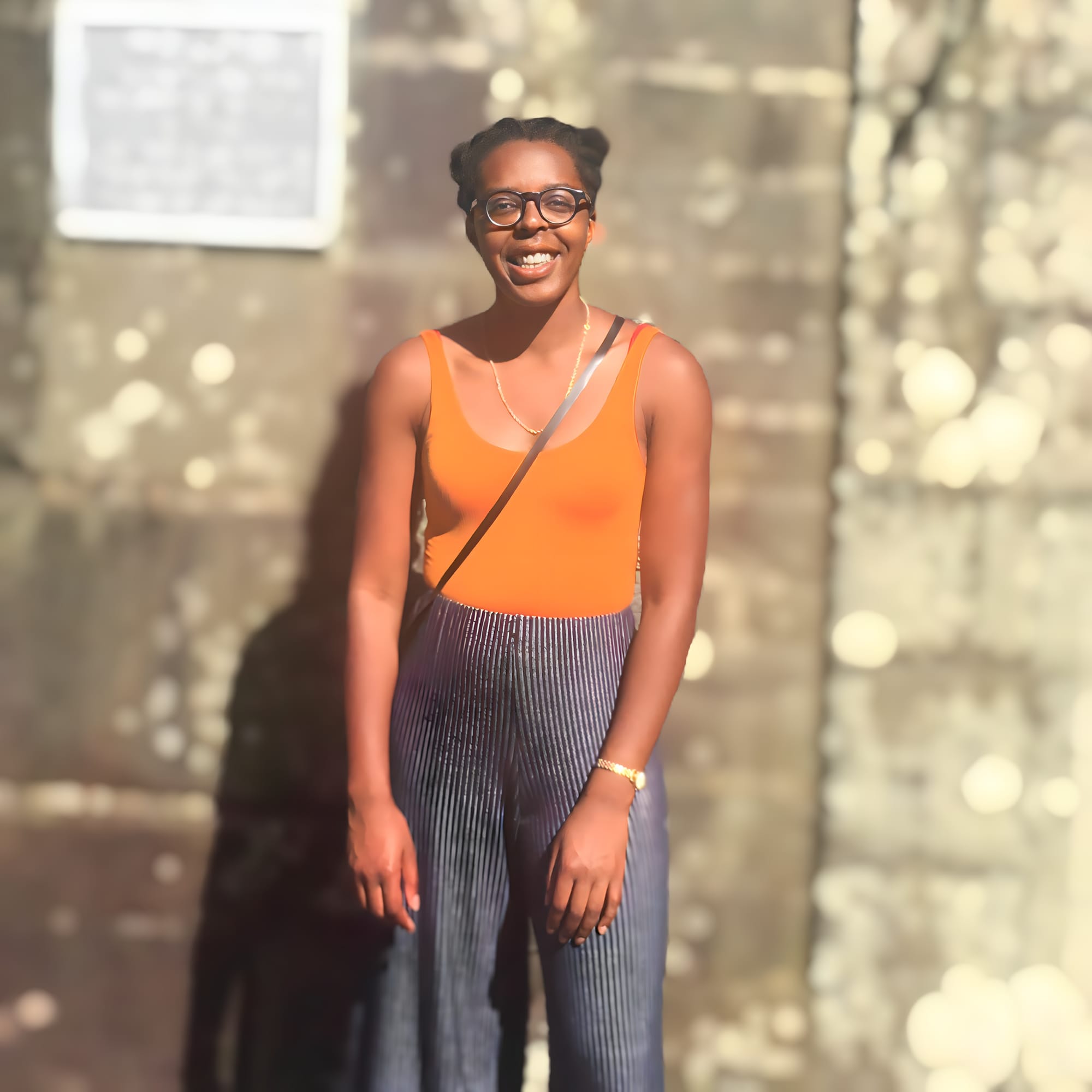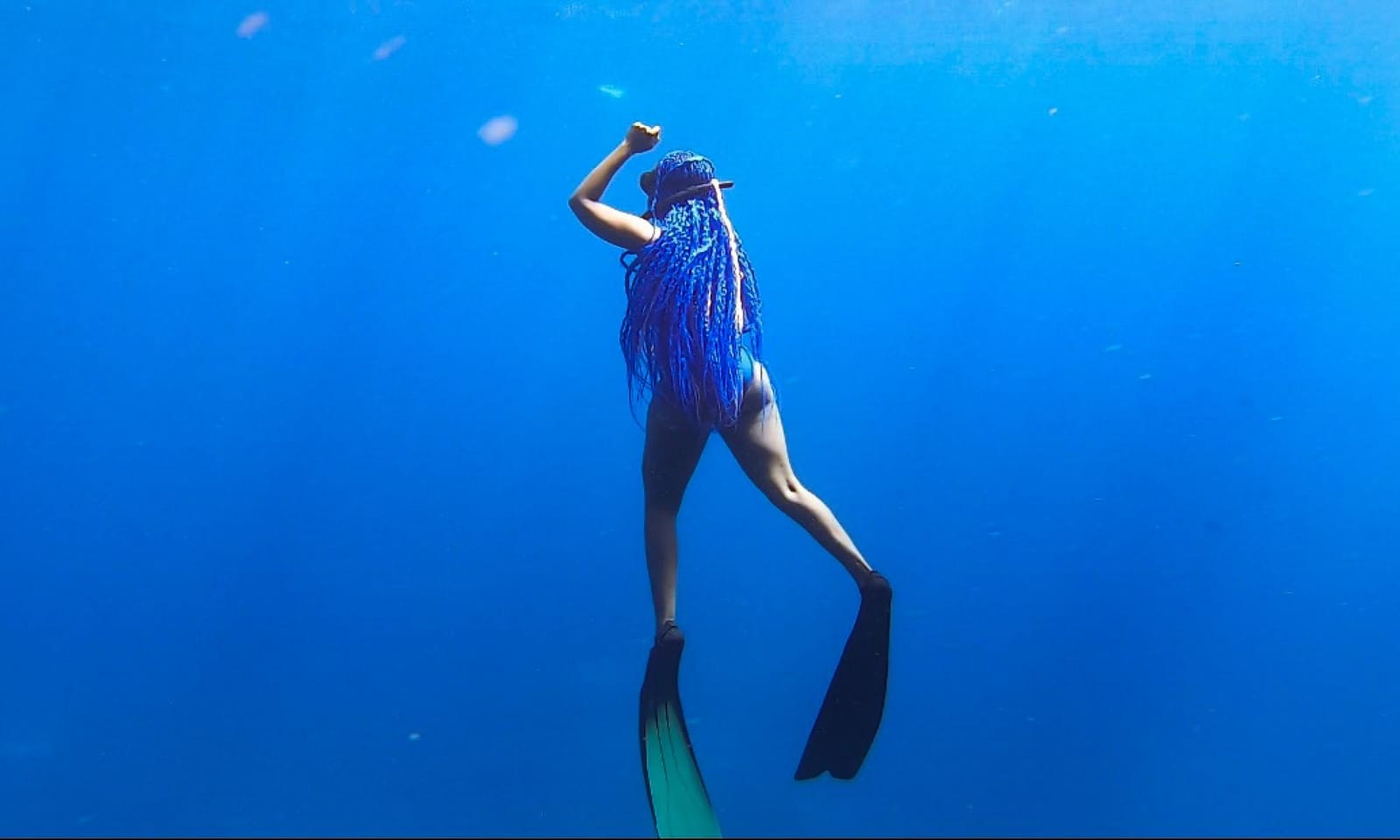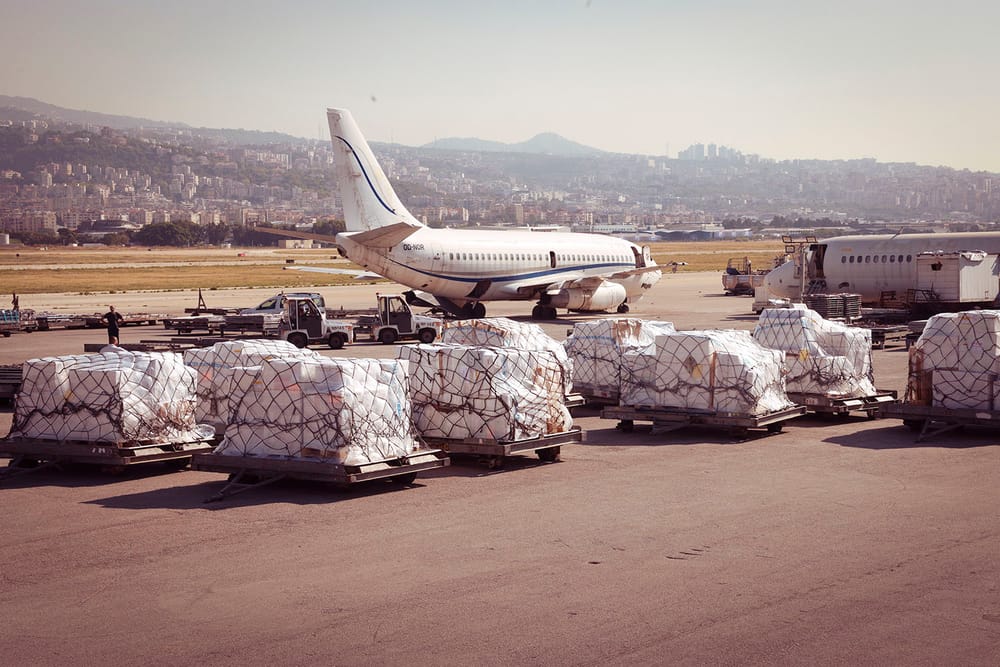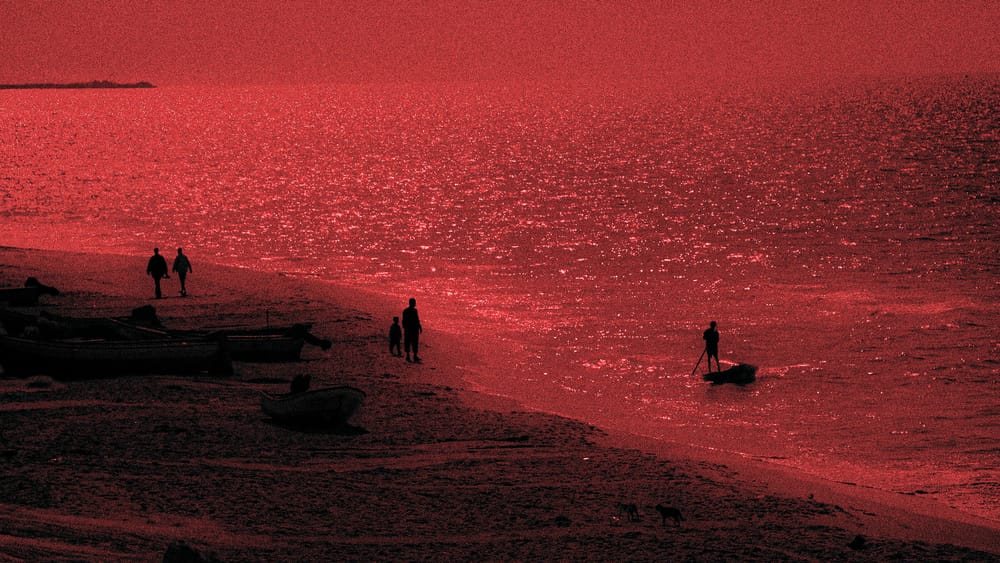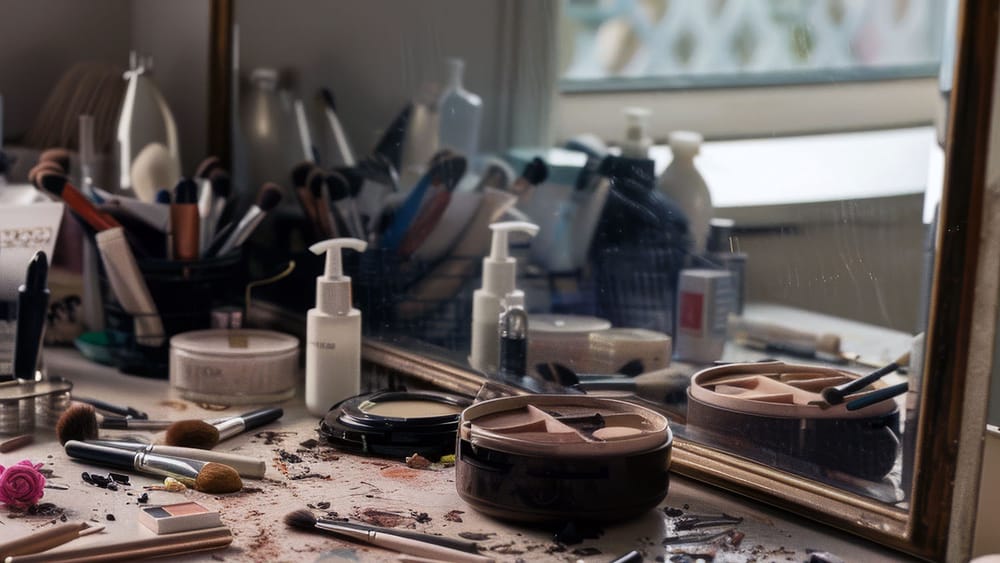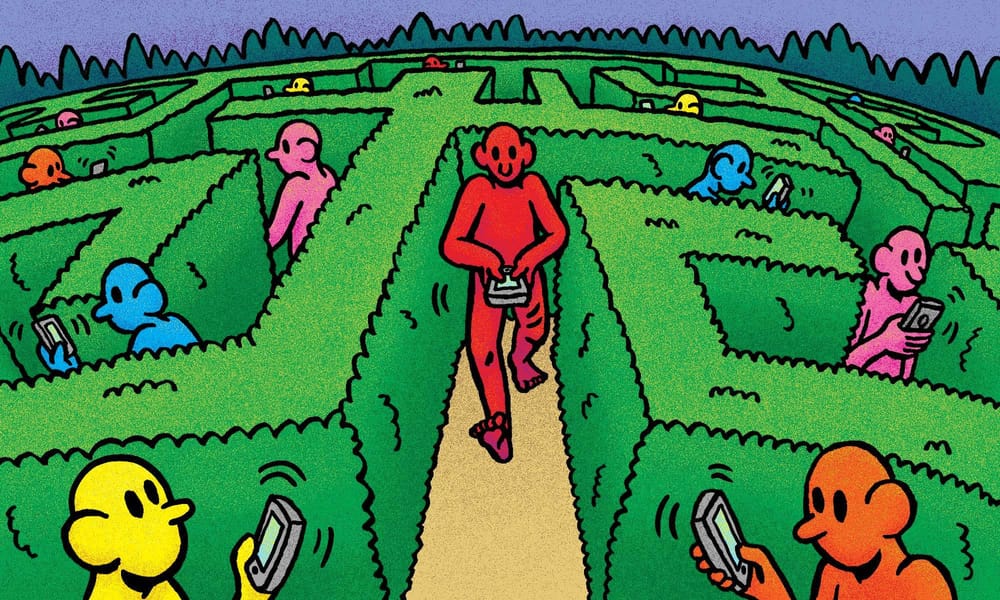In the face of the many seemingly unsolvable problems of the world, it takes courage, faith and determination to take on the role of a superhero. Colours of a Changemaker is a series of interviews with Black, Indigenous and People of Colour from around the world who are using their vocation to create social and environmental change. As Gandhi once said, we must be the change we want to see in the world, and these changemakers are doing just that through their art, music, written works, social platforms and much more.
Zandile Ndhlovu is a freediving instructor and conservationist based in Johannesburg, South Africa. She founded The Black Mermaid Foundation to help Black people overcome their fear of the underwater world, something she reminds us is a lingering effect of beach apartheid. By challenging the norms around what a conservationist or freediver should look like, Ndhlovu hopes to create a safe space for People of Colour to explore the majestic beauty of the oceans and to participate in their conservation.
Could you tell us what made you want to become a freediving instructor and how this led to starting The Black Mermaid Foundation?
So it all starts in 2016 when I go on this snorkelling trip and I’m just in awe of the life that lives beneath the surface of the water, right. But then also when I duck dive and I have those few moments on the ocean floor and feeling like I was at home in a way that I have never ever known before, that changed everything for me. And so when I started scuba diving, I just realised that it was not the same. And I remember my first freediving course and the first time we were in the water, it took me straight back to that moment in 2016 and I was hooked. I knew that this was where I wanted to be. And in that moment I knew that it wasn’t gonna be like scuba diving. I knew that I wanted to teach and I wanted to share this with the world and anybody who would listen. It changed everything. And so the minute I qualified, I knew that I needed to make a change. I realised that underrepresentation of Black people in the ocean space is a big thing. So what does it mean to create a safe space for exploration, but also what does it mean to expand the dreams that are currently known by little people? Growing up you can be a doctor or a lawyer or a teacher, but no one tells you that you could work in the ocean as well. And so I thought that The Black Mermaid Foundation would be a vehicle to create representation so that our dreams are no longer new, but they have been realised by someone who looks like us as well, and from those shoulders we can begin to expand. I started The Black Mermaid Foundation because I wanted to create a safe space for Black people to explore the waters. I realised the fears that we come from. I realised the stories that we grow up with, and I wanted to just create a safe space for that exploration and perhaps the expanding of normatives, knowing that our normative is normal too, and it’s the standard too. And I think I just knew that representation and creating a safe space would be a new way in which we could explore the ocean safely, and that’s how I started The Black Mermaid Foundation.
Being the first Black African freediving instructor in South Africa, how did you feel about the fact that there had not been others before you?
So, it’s such an interesting question of being the first Black freediving instructor in South Africa. It’s interesting because for me, first and foremost, I don’t think it’s an individual achievement; I think it’s a country’s achievement. It talks of a country’s ability to dream despite where it [sic] comes from. I didn’t grow up in a coastal community and I only found the ocean in my late 20s. So how did I feel about the fact that there wasn’t one before me? I don’t know how I felt about that also because I didn’t know about freediving until, you know, until I was 28, 29... 30 actually! And so I don’t know how I felt about it, but I did realise that there are many big fears that are attached to the ocean, and perhaps that that could be a thing. But what I did know is that this would be a change maker, this would be the moment where we can bridge a gap and the fear can be bridged in hope that we could explore, in hope that we could try despite our fears. And I think that is an important part of this whole narrative. I have my own dreams that are linked to freediving, but I definitely think the one of being the "first" was never my goal and it just happened to be a fact along the way.
What challenges, if any, have come with this role?
I would definitely say in any space where Black people, or anybody, is underrepresented, it assumes its normatives to be the norm and anyone who is not part of that group to be abnormal. So I’ll give a few examples: your hair, you know, “Are you gonna go down with all of that hair? You should tie that hair up. What are you gonna do with your hair?” No one else gets asked about their hair, but you get singled out about your hair, [or] be it if it’s your body. But also then, just realising that in any space where you are not assimilating to what is the current normative, you find resistance. And in finding resistance is often also the realisation that no one wants to address the truth of the fact that underrepresentation is due to a reason. And what does it mean to explore that reason? And so there’s an expectation for you to assimilate or an expectation for you to fold into the normatives of the house and not disrupt the house, and I think that’s a difficult thing when you need to live in your truth as well. We can share passions but also recognise that we come from different places.
Do you think the lack of representation in ocean spaces extends further than South Africa and freediving, and if yes, why?
So I do think that a lack of representation in the ocean space extends way past South Africa. I know that it’s the same in many African countries, but I also know that it's the case even in the States. I get many messages from people from across the world where everyone is talking about, asking me about, how I managed to get past my fears in order to make this freediving world a reality. So I definitely do think that it extends past South Africa, but I always say there is history and context to the fear...when you look at South Africa, at one point Black and Brown people did not have access to the ocean. And so when we tell the story of Black people not being water people, we always need to reference its context in order for it to make sense. So I think recognising history as a big part of the reason why Black people aren’t in the water is important. I think that helps us to begin to remedy the problem, because then we can acknowledge that it’s not by choice, but it was actually by a system that was oppressive to a particular people.
Through your work, you explore conservation along with diversity and inclusion. How do these go hand in hand?
I often say diversity and inclusion is the most important thing, because in every single way it benefits everybody. When you look at conservation in the way in which it currently exists today, I feel like it often comes across as very elitist and that it belongs to “them” and not everybody. And so for me, I always say if we’re gonna save our oceans, we can only save them together. When I look at South Africa, Black people make up 70 percent of the population. So if there’s going to be change in anything that we’re trying to save—be if it’s our oceans, our plastic, trying to curb single use plastic—we need all hands on deck. And so when we diversify our oceans, we diversify and we increase the number of advocates that are going to be taking care of our oceans; we increase the number of people that are going to be making active decisions to protect these oceans. And I think that is a powerful place to be. So diversity and inclusion, in any and every way, benefits everybody. It is always worthwhile to pursue it, because it is only when we work together that we can begin to see the change that we hope to see in the world.
Does lack of representation/diversity have an impact on conservation and if yes, how?
There is definitely a problem with having a lack of representation in the conservation space, because we need to see ourselves; representation is important. There’s an organisation that I was talking to recently and they said, “You know Zandi, we are big on representation,” and I said, “Okay cool, show me all of your mentors. Show me the people that go out into these Black and Brown communities,” and everybody was White. And the people, obviously in the office, that are helpers, are Black. So my question always said: what does it mean when the only people who show up as authority in a particular subject look White and don’t look like you? Then you begin to believe that only they can be conservationists, or only they can be missionaries, or only they are the way in which you can be saved. And I think those are the narratives that we need to explore in ourselves to say, “What does it mean to ensure that when we go into a community, there is someone, or there are people who look like the people that we are going to so that the people in the community can believe for themselves that that kind of work can be theirs too?” This is the thing about representation, that you can only really begin to believe that you can once you’ve seen someone who looks like you doing that. And so when I look at the ocean conservation space, I always say representation is important because at the end of the day, you want ocean-facing communities to be taking care of their own oceans. We cannot be NGOs working in areas for over 20 years. There needs to be ownership; there needs to be authority; there needs to be a handing over of responsibility to the ocean-facing communities that we’re working with and expand ourselves to the different other places that we haven’t been. So I think it’s a very very important thing to ensure that there’s always representation in whatever work that we do. Whatever communities we’re going into, we need to make sure that we upskill the people in those communities so that they become their own champions as well. This is a crucial thing if we’re going to change any kind of narrative, especially narratives around the ocean and who belongs in the ocean and who doesn’t.
I always believe in collaborative efforts, and when there is a lack of representation, then people that are excluded from that particular narrative stay out of it. And if everyone is staying out of it, then we have a bigger problem. Again, when we see ourselves represented, we begin to believe that we can be changemakers. We begin to believe and see that the oceans belong to us as well; they don’t belong over there, but they belong here too. I think once we create the connection with the ocean, only then can we actually bring the change. So if there is no diverse representation—take South Africa, where Black people make 70 percent of the population—who are you talking to when you’re saying, “Say no to single-use plastic”? It can’t only be to the 10 percent of people that might have access to the ocean or 20 percent of people that have access to the ocean. You need all hands on deck and representation talks to that. It says: “Also you can be. It’s also your oceans and it’s also your responsibility to be working towards saving these oceans and ensuring that they are kept in this pristine way for the many years to come.” I think that is a very very important thing in the conservation space.
Was conservation something you were aware of, or educated on, before you began exploring the ocean yourself?
So I can definitely say that conservation for me is something that I had never heard of. And it was not anything that I cared about. I mean, when I first explored the ocean in 2016, I was still just enjoying it, and I think I started to become aware in 2018. And that kinda tells you something, that even when you begin to explore, that doesn’t necessarily equate to caring. So what does it mean for us to connect the dots, to say, “Hey, this is actually connected to that”? And I think that’s the challenge with access to ocean spaces, be it if it’s by resources, as in you don’t have money to get to the ocean, or be it if it’s just a place that you can’t go because you don’t know how to swim, you’ve never been there, you’ve been told you don’t belong there. In whichever way that you interact with the ocean, until you find your own connection, only then can you begin to see and begin to care about its upkeep and its protection. So for me, I definitely did not care about conservation until probably two, three years ago... just going on dives and you come across a shark with a fishhook in its mouth, and you realise that our human impact is everywhere. And how is it that we can’t go anywhere without leaving a mark like everyone else in the ocean or every other animal in the ocean? Why is it that our world needs to fall into the ocean space? And how can we be better as humans and how can we become more conscious in our existence? So I definitely think that a connection has to be built, but also the line needs to be drawn for people who have not previously had access to the ocean. And I know that because of my frequent diving, I eventually found myself there. But what does it mean for people who have less access? Because we need to then highlight that problem there as well.
Where do you see Black representation in free-diving in the next 20 years?
I see marine biologists that look like me. I see an ocean full of colour in the way that we all exist. I see careers recreationally and in sports becoming a bit more diverse, because when we move from the world of firsts we begin to dream differently. So all of a sudden you’re dreaming with a colour; you’re dreaming with knowing what is possible for someone who looks like you as well. And I think that is a powerful place to be. In the beginning, you don’t know what you don’t know, and once you begin to see what is possible outside of what you always thought was just, “for those people” or “not for me,” I think the dreams begin to change. And I even see when parents message me and they’re telling me about how their kids love my content and they love seeing me underwater, you realise that everything is changing, but also even their imaginations; they are beginning to dream in a way that looks like them as well, and I think that is a powerful place to be.
As someone who spends a lot of time in the water, what are your hopes and dreams for the future of the world’s oceans?
That they would be protected. That sharks would be protected. That the way in which we live looks to protect these oceans. That we could be conscious in every decision that we make. My hope is that generations to come will be able to witness the majesty that lives underwater, be it if it’s great white sharks or turtles or dolphins. And when I think about not having those animals there or not having whales there, not having healthy coral reefs, the idea is devastating. The thought is devastating. And so my hope is that we could be better as humans. My hopes are that we could protect these oceans every single day, with every decision that we make, so that we can make this magic, and this paradise, accessible and possible for everybody to witness.
You can follow Zandile Ndhlovu on Instagram here, you can learn more about her work here, and you can donate to The Black Mermaid Foundation here.


